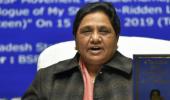How Bahujan Samaj Party, which turns 40 in 2024, is bracing for a new era.

On December 10, in Lucknow, Bahujan Samaj Party President Mayawati announced that her nephew Akash Anand would be her political successor.
Some have since asked whether the icon of Dalit politics succumbed to the lure of dynastic succession, just as several other parties that profess to fight for social justice.
Some others say the BSP's electoral and ideological situation is more profound.
Mayawati's politics, critics have said, transitioned from her mentor Kanshi Ram's Bahujan assertion to espousing Sarvajan ideals, and hit ideological rock bottom by picking her Parivarjan, or family members, to lead it.
Akash's father Anand Kumar, Mayawati's younger brother, is the party's vice president and second in the hierarchy. He manages the party's finances and coordinates with its zonal committees.
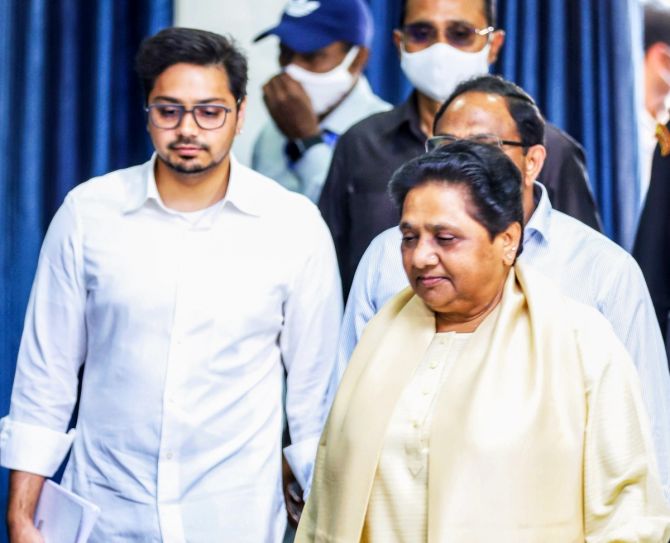
A BSP leader, who did not want to be named said. "Behenji" -- a term of respect for elder sister -- is testing the waters by projecting 28-year-old Anand, since potential competitors, such as Chandrashekhar Azad of the Azad Samaj Party, have started to attract the Dalit youth. B
But others believe the task of reviving the BSP in Uttar Pradesh is too onerous a burden on young Akash, who has a degree in business management from London and has been associated with the BSP since 2017.
Dalit activist Ashok Bharti says the challenge before the BSP is far greater than one of mere succession or appealing to the Dalit youth, especially after the 2022 Uttar Pradesh Assembly polls.
"Our good wishes to Akash. We hope he brings fresher perspectives to the BSP's politics and reaches out to the Dalit youth. But the BSP's predicament in Uttar Pradesh is grave now that UP has shown a propensity towards a two-party system, or bi-polar politics," Bharti, who leads the National Confederation of Dalit and Adivasi Organisations, told Business Standard/
The BSP, born in 1984 due to the labours of Kanshi Ram and his associates in stoking a Dalit consciousness, turned into India's most successful political startup within a decade.
By 1995, Mayawati became the chief minister of Uttar Pradesh, heading a coalition government.
A dozen years later, in 2007, the BSP formed a majority government in the state.
Its vote share in other north Indian states increased, and a phalanx of parties, comprising the 'Third Front', projected her as their prime ministerial face for the 2009 Lok Sabha polls.
The decline was equally rapid, once the BSP lost power in UP in 2012.

The slide to 2022
Even in its worst times, the BSP commanded a 20 per cent vote share in UP, a state with a 21 per cent Dalit population, with Jatavs, the caste that Mayawati hails from, forming 54 per cent of its scheduled caste population and 12 per cent of the total population.
But the 2022 assembly polls were a disaster. The BSP recorded its worst performance in UP since 1989.
Thirty-three years ago, the BSP won 13 seats with a 9.41 per cent vote share. In March 2022, it won only one seat.
Its vote share was 12.88 per cent, down almost 10 percentage points since the 2017 assembly polls.
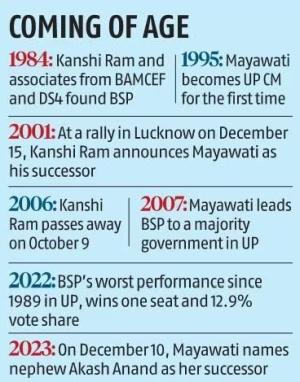
The BSP's Brahmin outreach failed. Muslims voted nearly en bloc for the Samajwadi Party.
According to a post-poll survey by Sudha Pai and Sajjan Kumar, 87 per cent of the Jatavs voted for the BSP in 2017, but only 65 per cent five years later.
The BSP's support among other Dalit castes dropped from 44 per cent to 27 per cent, and among non-dominant Other Backward Classes it dropped from 11 per cent to 4 per cent.
Attracted by the idea of inclusion within the bigger Hindu identity and as beneficiaries, 'labharthi', of the Centre and state government's schemes, several Dalit castes shifted.
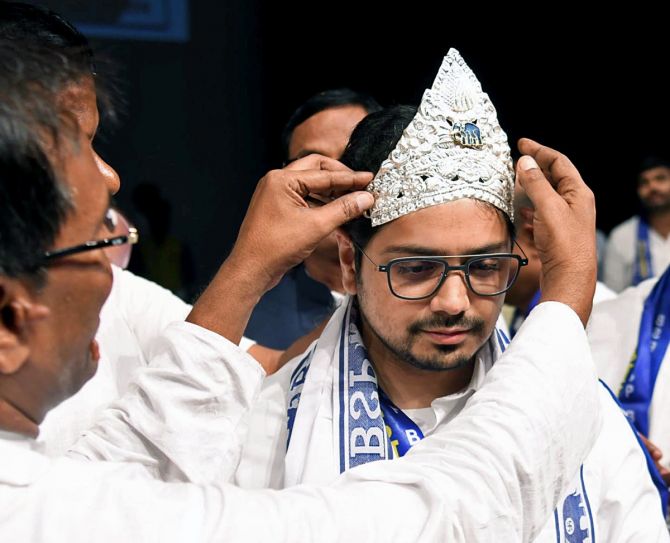
For now, Akash will continue to be the BSP's national coordinator, a post his aunt appointed him to after the 2019 Lok Sabha elections, and rebuild the party outside Uttarakhand and Uttar Pradesh.
Akash has run the party's social media outreach since 2017. More recently, he was associated with the BSP's Rajasthan, Madhya Pradesh, and Chhattisgarh assembly poll campaigns.
But the BSP, Bharti argued, has to decide if it will pursue a politics of exclusion, of focussing only on Dalits, and that too on its dominant sub-caste of Jatavs, or of inclusion by reaching out to other marginalised communities.
Kanshi Ram spent the initial years organising scheduled castes working in the government.
Subsequently, he inducted Kurmis, Mauryas, Rajbhars and leaders of other castes, including allying with Mulayam Singh Yadav in 1993.
The BSP has shown signs of returning to its roots in recent weeks.
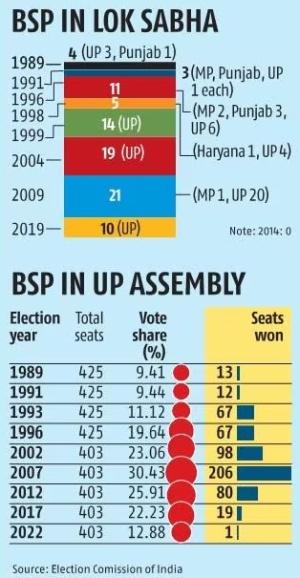
Return to roots
In her post-poll analysis in 2022, Mayawati noted how the Muslims did not vote for the BSP.
On December 15, she criticised the new BJP government in Madhya Pradesh for banning open sale of meat and eggs. However, the party received flak for suspending its Amroha MP, Danish Ali.
For the Chhattisgarh assembly polls, the BSP aligned with the tribal Gondwana Gantantra Party.
Until now, Mayawati has maintained that her party will not ally with any of the bigger parties for the 2024 Lok Sabha polls. However, sources in the Congress and SP say they have an open mind.
The BSP's slogan in 2009 was 'UP hamari, ab Dilli ki baari', but that did not go to plan and Delhi remains far.
"It is an existential crisis. We cannot recover lost ground through social media. We need to forge alliances and reshape our ideological contours," a senior BSP leader said.
As Pai and Kumar observed in their recent book, Dalit Politics In The Time of Hindutva, the scenario is gloomy for the BSP 'with its party organisation having broken down, its social base unravelled, its ideology no longer attractive to the electorate, including the Dalits', and all parties competing to prove their pro-Dalit credentials.
But the BSP has thrown up surprises before.
Feature Presentation: Rajesh Alva/Rediff.com


